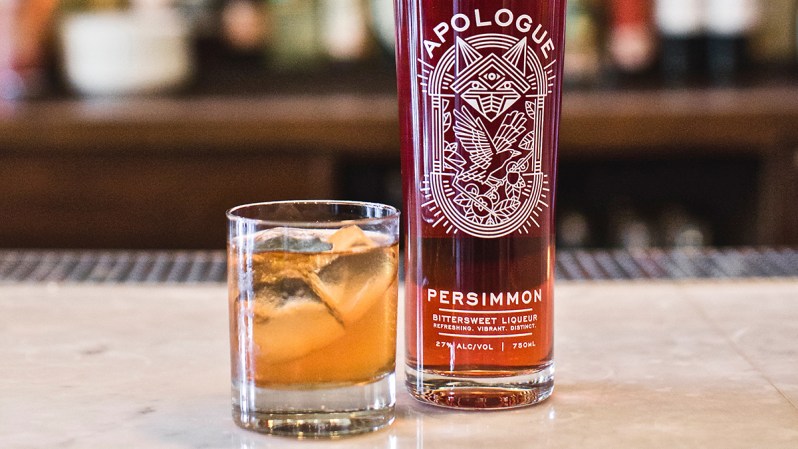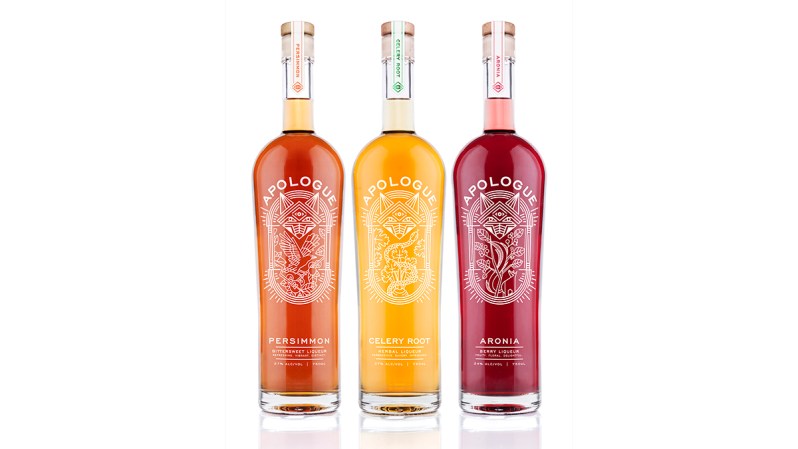It’s no secret the Midwest is a fertile ground for agriculture, but, sadly, the region doesn’t have a rich history in American taste-making (unless you count the Super Bowl Shuffle and hot dish, of course).

As the American consumer becomes more interested in artisanal wares, however, Midwest creators have been able to build some clout — like Apologue Liqueurs, who is helping prove under-appreciated native Midwestern ingredients are great for cocktails. The Chicago-based company currently has a line of three liqueurs made with Midwestern Aronia berry, persimmon, and celery root.
Co-founder Robby Haynes was working in Chicago bars and experimenting flavors when a friend of a friend wanted to start liqueur company. Haynes and co-founder Jordan Tepper then spent nine months researching and experimenting with different recipes to come up with what was missing from behind the bar.
“I got pretty excited about the idea,” Haynes says. “It was a great opportunity to change the stigma of liqueurs, many of which are really sweet and full of artificial flavors and colors. It seemed like there was a good opportunity and it was a good time to bring liqueurs into the modern age.”
“We got really excited about working with local farmers for primary ingredients and we were dead-set on making them with all natural ingredients and no artificial colors,” he adds.
The general recipes were fairly quick to come up with, Haynes explains, but with every batch, the duo continued to tinker and make small adjustments to increase the overall quality and consistency of the products. The ingredients all come from within 100 miles of Chicago and the business is working on growing certain things within the city limits.
Right now, Haynes says Apologue Liqueurs can be found in approximately 80 bars and restaurants, as well as liquor stores like Binny’s Beverage Depot and Foxtrotco. The brand is hoping to expand distribution in the future.
“Our plan has been to take it slow and continue to dial in our packaging and really get our ducks in a row before we try to grow,” Haynes elaborates.
Likewise, the product line is expected to grow in the near future. “There are brands with 10 types of liqueurs,” he says. “Our vision is to do that, but do well with interesting flavors and thoughtful and interesting notes that can be enjoyed. A lot of the older liqueurs you have to mix because they’re too cloying or sweet. Ye,s you can mix ours, but they are complex and can be sipped on ice with a twist.”
Apologue Liqueurs Lineup

Haynes suggests trying the liqueurs first with a small ice cube to tease them out and get a true sense of their essence.
Aronia Berry
“The most versatile of the bunch,” Haynes said. Aronia Berry Liqueur has notes of various tart berries, including Aronia, or chokeberries, and adds a punch to an Old Fashioned, allowing you to skip the simple syrup in the process.
Persimmon
The Persimmon Bittersweet Liqueur is Apologue’s take on an amaro, similar to Campari or Aperol. It’s bitter already with the persimmon, a tomato-like sweet fruit, but also adds rhubarb and orange peel. Made for use in Negronis or a spritz.
Celery Root
The most savory of the bunch, according to Haynes. Along with celery root, ingredients include tarragon, dill, and fennel. Use it in a Celery Collins made with your choice of gin (this is our choice), lemon, celery root, and soda. A Bloody Mary would serve well with Celery Root Liqueur, but Haynes also said a simple Celery Root Liqueur and tonic is excellent as well.
If these liqueurs sound good enough to travel to Chicago (hint: they are), we recommend getting a coffee massage while you’re there.


